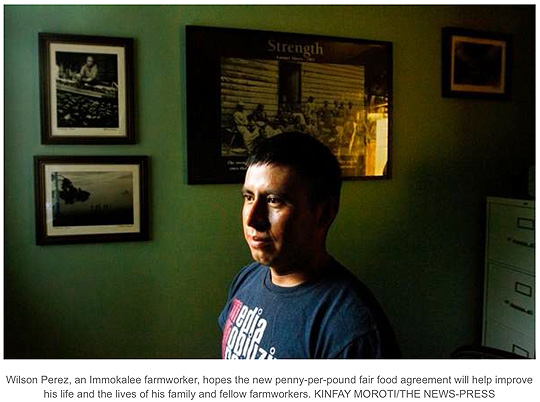[hupso_hide][hupso title=”I have lived something children will one day read about – Wilson Perez, farmworker in #FairFoodProgram… More at @CIW site!” url=”https://ciw-online.org/?post=18233″]
Farmworkers speak about the “historic” impact of the Fair Food Program on their lives in a moving new article from the Ft. Myers News-Press…
This past Sunday, the local newspaper of record here in Southwest Florida, the Ft. Myers News-Press, ran a front page look at the Fair Food Program (FFP) that truly stands out against the backdrop of coverage by other state and national media of the groundbreaking human rights initiative that is quietly revolutionizing agriculture in Florida.
Entitled “Southwest Florida farm workers’ struggle paying off,” the article covers all the new workplace standards and statistical advances under the FFP that are touched on in other stories — “time clocks, outdoor shade and 80 extra bucks a week… Since 2011, at least $11 million more in wages have reached farmworkers,” and so on — and includes a nice timeline for the Campaign for Fair Food since its launch in 2001 (below), but it goes deeper than those surface measures. The News-Press piece really distinguishes itself by taking the time to actually talk with workers experiencing the changes and giving them voice to express what those changes mean to them and to their families.
So definitely go to the article itself while you still have a chance (the News-Press website only allows access to new articles for two weeks!), but, meanwhile, here below are a few of the excerpts to get you started:
For those accustomed to middle-class wages and workplaces, recent improvements in the region’s tomato fields might not seem radical — time clocks, outdoor shade and 80 extra bucks a week.
But for Southwest Florida’s farmworkers, they’ve been huge.
Historic, even, says Wilson Perez, one of the people in the middle of changes to the state’s $650 million tomato industry. Most recently, the largest reteailer on the planet, Walmart, pledged unprecedented support to farmworkers.
“I have lived something children will one day read about,” the 23-year-old says. “And it’s something that’s still going on.”…
… Since late 2011 at least $11 million more in wages have reached farmworkers during the winter growing season, when Southwest Florida supplies more than 90 percent of the nation’s tomatoes.
It’s only been flowing about two years, but it’s made a big difference, Perez says. With a per-capita income of $9,518, according to the U.S. Census Bureau, 45 percent of Immokalee’s approximately 20,000 residents live below the poverty line. Now, when there’s work in the fields, Perez says his extra $60-$80 a week goes for food for his wife and 8-month-old son, his $1,000 monthly rent and, most importantly, to send to his little brothers and sisters in Guatemala for their schooling.
“I don’t want them to struggle like I’ve had to,” he says…
Amy Bennett-Williams, the News-Press reporter, also speaks with an young farmworker who is the mother of two young children whom she supports by working in the fields. She had a different cut on the value of the program to her family:
For 24-year-old Immokalee single mom Mely Perez (no relation to Wilson), the extra cash to feed her two young sons is helpful, but what really feels historic to her is being able to make them breakfast in the morning before walking them to school from her tiny house, for which she pays $700 a month.
In the days before the agreement, she’d slip out in the pre-dawn dark while the boys were sleeping to catch a bus for the fields, leaving them with a friend until she returned that night, aching and exhausted.
The Fair Food program prohibits the longtime practice of hauling workers to the fields early, then making them wait to work until the dew dries. Now that unpaid time is a thing of the past, the Mexican-born Perez can spend her extra hours with her little boys.
Wilson Perez has the last word in the moving article:
“Those who don’t have contact with the agricultural world — the people in cities — tomatoes just arrive in their stores (and) they don’t think about how they get there, about us — the people who pick them with our hands, and how hard the work is,” he says. “But we want them to know. We want it to be important to them, because we all have to eat, and in that way, we’re all connected.”
Definitely head over to the News-Press to see the article in full, which includes a special bonus video on the Student/Farmworker Alliacnce’s exciting new “Boot the Braids” campaign, and check back again soon from the mobilization front for next month’s huge Now Is the Time Tour!

